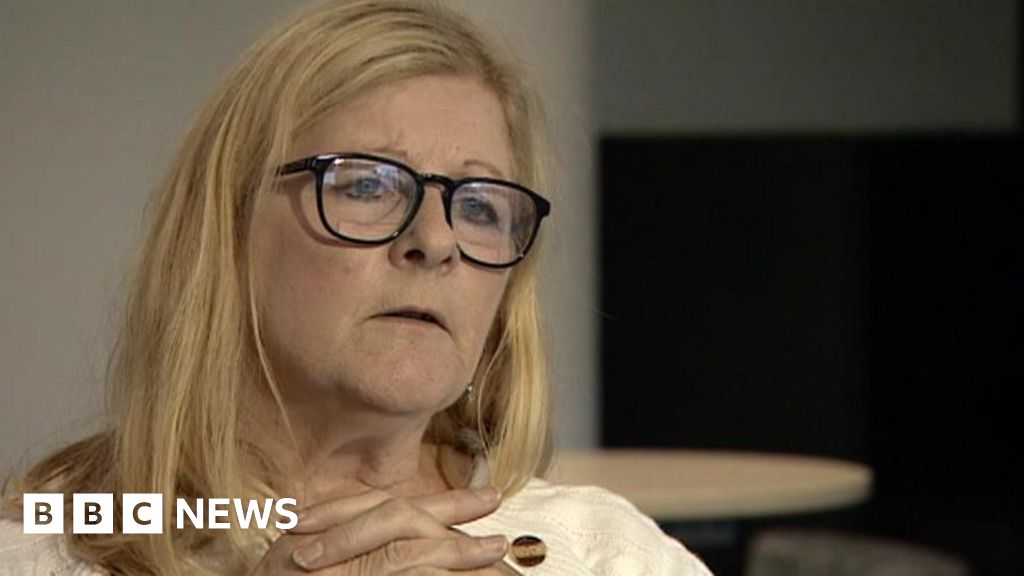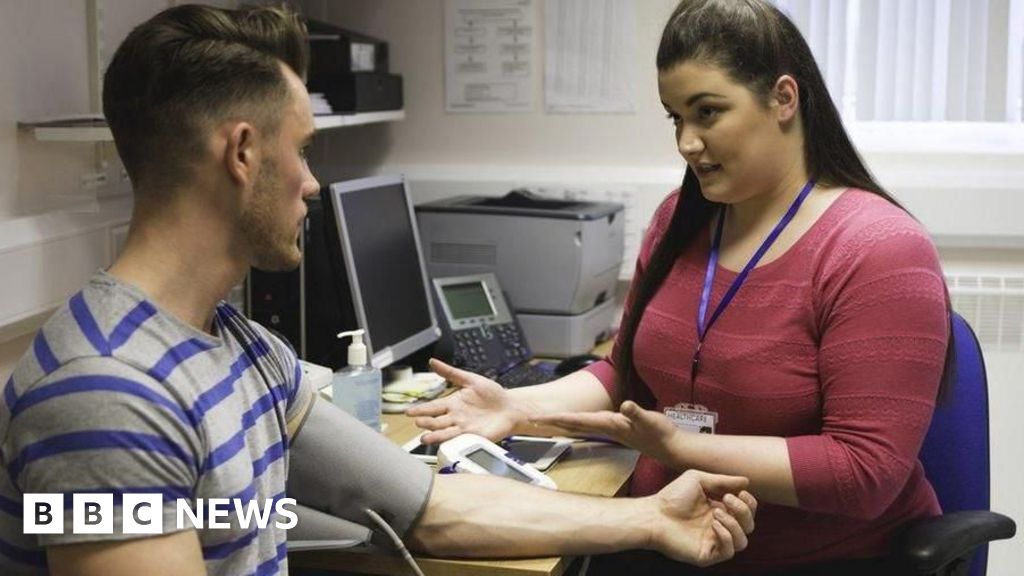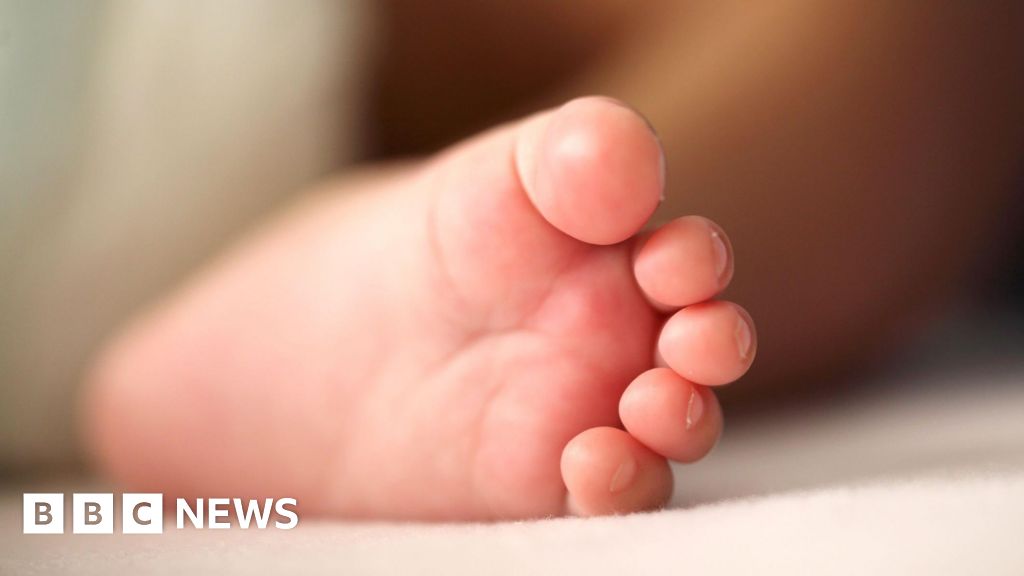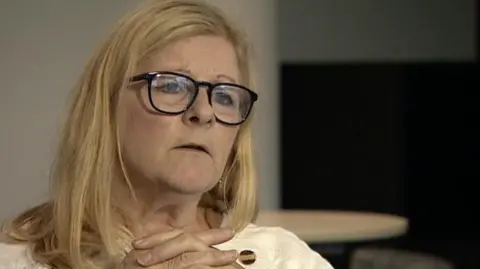 BBC
BBCPatients who had probes located in the wrong part of their brain due to failings at an NHS trust suffered unnecessarily for years, a damning report has found.
The leaked report into deep brain stimulation (DBS) surgery at University Hospitals Birmingham NHS Foundation Trust, seen by the BBC, also shows a whistleblower was ignored, intimidated and disciplined.
Wendy Swain, who had electrodes in the wrong place for 11 years, leading to difficulty walking and a facial twitch, said: “They’ve made my life hell.”
The trust, already under fire following an inquiry that exposed a culture of bullying and a lack of openness, said it was “truly sorry” for the mistakes and felt “deep regret”.
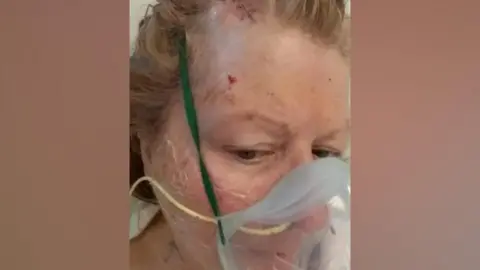 Wendy Swain
Wendy SwainDr Chris Clough, former chair of the National Clinical Advisory Team who oversaw the final report into the brain surgery failings, said he did not believe the trust was learning lessons.
“I am begging them to get this report out and be open and fair with patients,” he said.
“There’s suffering that has gone on here and they need to let people know what went on.”
DBS is a surgical treatment for people with severe movement disorders like Parkinson’s disease and dystonia.
Electrical pulses can significantly reduce a patient’s uncontrollable shaking and improve their quality of life.
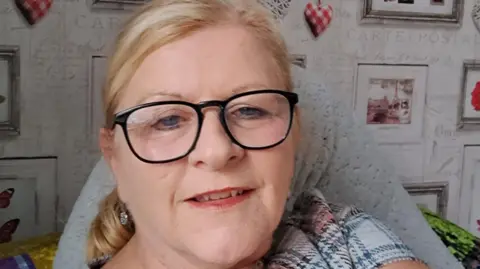 Wendy Swain
Wendy SwainThe Queen Elizabeth Hospital in Birmingham, which is run by the trust, one of the biggest hospital trusts in England, pioneered the procedure and was one of the leading centres in the UK.
But changes in staffing around 2017 led to the service’s performance getting worse, the independent report found.
Patients were left unable to walk, with slurred speech and eyesight problems. Some had to leave their jobs and reported suicidal feelings.
The report also revealed:
- Two patients had electrodes unnecessarily removed from their brains when they were in the right place, denying them a chance of better health
- Images taken before patients were operated on were presented at quality control meetings once the surgery had been carried out, which could have had misleading consequences
The primary surgeon in the DBS service at the trust at this time was Anwen White – best known for operating on Malala Yousafzai, the Pakistani schoolgirl shot in the head by the Taliban.
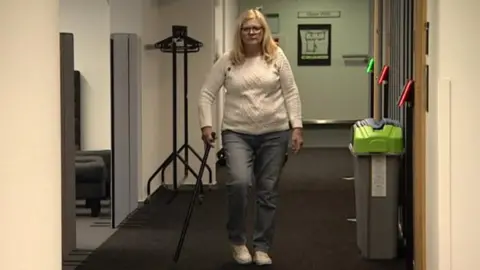
Mrs Swain’s first operation by Mrs White was in 2013.
After the surgery, the patient said she immediately noticed her foot was dragging and she suffered a severe facial twitch.
A review of her case found the right electrode was in the wrong position.
It took six years for Mrs White to carry out a further operation but a repositioned electrode was later discovered to have gone down the same track as before and her problems continued.
“They’ve made my life hell. My mind had to reset itself to being more disabled,” Mrs Swain said.
“I look at people walking and think ‘I wish I could be like that’. I just want to be how I was.”
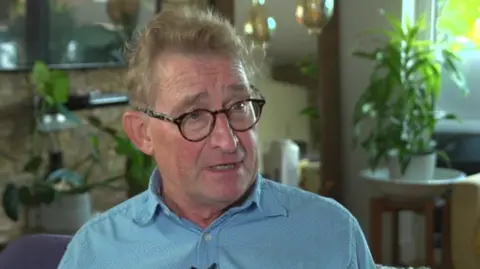
Senior nurse Jamilla Kausar turned whistleblower to raise concerns about patient safety and the service was suspended in July 2017 by the divisional director.
But the report stated not only was she not taken seriously, she became the victim of retaliation by medical colleagues and there was a missed opportunity to act on her concerns. She later faced disciplinary action.
The service was stopped and restarted a total of three times, finally ending in October 2019.
Ms Kausar began sending patients reporting difficulties to the John Radcliffe Hospital in Oxford.
In January, 2020, Prof Tipu Aziz, from Oxford University Hospitals NHS Trust, wrote to the clinical lead for neurosurgery in Birmingham, stating: “We have revised 10 cases last year and now have another eight so far.
“The implants have been incompetently done.”
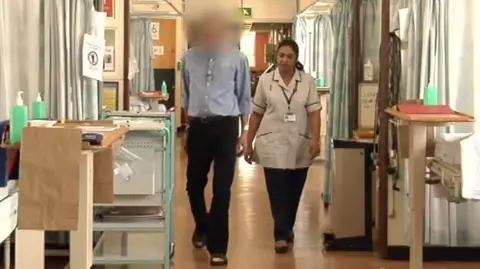
The failure was initially exposed by a serious incident report into the care of Chris Tyler.
Probes inserted by Mrs White in 2017 and replaced in 2019 led to slurred speech and an inability to function.
Both times, the probes were in the wrong place and the failure was finally put right by further surgery in Oxford.
“There was a culture of failure and a culture of not wanting to take responsibility for what happened and I feel a bit betrayed,” Mr Tyler previously said.
Another patient, Keith Bastable, developed “intolerable side effects” from his surgery in April 2019, including slurred speech and eyesight problems.
Mr Bastable wrote to the trust saying that he had only seen Mrs White twice – the day of the operation and the day that programming of the electrodes started.
It was not until his meeting at the neurosurgery unit in Oxford that he was told that the leads were so far away from the target that they couldn’t work.
“Nobody would tell me what was wrong and Mrs White wouldn’t see me. I went to Oxford and they told me exactly what was wrong,” he said.
“Why didn’t Birmingham tell me?”
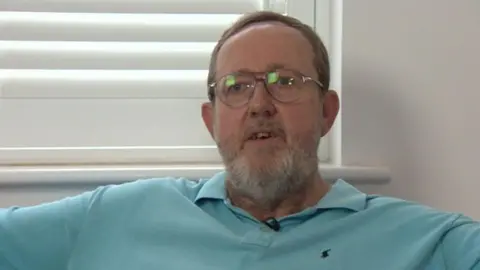
A further operation in Oxford has now corrected the problem and he is able to work and play walking football.
His wife Jennifer said: “I’m angry. We have lost precious time.
“Why hasn’t someone said enough is enough? Patients had to start complaining to make things happen.”
After the service was halted a third time, a review concluded 12 out of 15 patients, in a sample taken between 2017 and 2019, potentially had misplaced probes.
The final report concludes 38 patients were found to have unsatisfactory outcomes.
Although problems with three surgeons were highlighted, it was the period 2017-19 where there was a 59% failure rate that was of most concern.
A previous independent report in 2021 stated Mrs White had been trained by a senior neurosurgeon who made similar mistakes and it was not surprising she had difficulties.
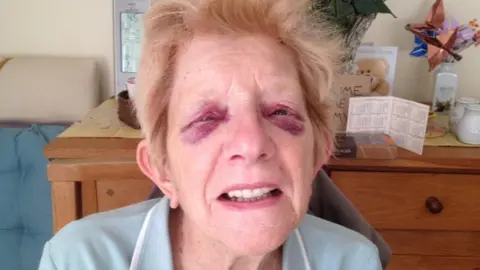 Family
FamilyOne of the last patients treated by Mrs White was Patricia Hunter in September 2019.
Her surgery led to a facial twitch, speech and vision problems.
Reviews found the electrodes had been placed too deep in her brain but Mrs Hunter’s husband David claimed Mrs White continued to say everything had been done correctly.
“There was no admission of anything being wrong. It was always that the electrodes were in the right place and we have just got to get it programmed,” he said.

The medical defence union told the BBC Mrs White was unable to comment on any of these matters due to patient confidentiality.
University Hospital, Birmingham, said the DBS service was suspended indefinitely in 2019.
“It is clear that many patients had a poor outcome from their surgery, and in some cases, their symptoms, health, and mental wellbeing worsened,” a spokesman said.
“This is a matter of deep regret and the trust has worked to learn from this.
“We would like to repeat our apology to patients who were not made aware at the time of surgery of the sub optimal placement of electrodes.”
The BBC has learned that neurologists – and the neurosurgeon who undertook the majority of DBS procedures in 2017-19 and whose results marked them out as an outlier – would not take any further part in caring for DBS patients.
A surgeon who has had a period of absence is being supported in re-establishing their practice in other areas of neurosurgery.

